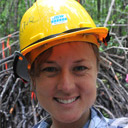
CIFOR scientist Elena Mejia, right, accompanying Kichwa villagers who are transporting wood downstream on the Arajuno River, Ecuador. Tomas Munita/CIFOR
Bulldozers churn in the mud and block the sticky, bumpy road up ahead as Elena Mejia and Ayme Muzo head to a rural indigenous community in Ecuador’s Napo province. The young Ecuadorian researchers have to wait an hour until the road workers clear a narrow space for their 4WD to sneak through.
Delays like this are an everyday part of the field research they’re working on as part of an investigation by the Center for International Forestry Research (CIFOR) into domestic timber markets, interviewing and surveying community members about the way they use forest resources.
And once they get to the village, the community may not be prepared for them, as there is often no mobile phone signal, requiring multiple visits – via unsealed roads – to each community to set up meetings.
But these practical headaches are not the hardest thing about this kind of field research, Elena says.
“The biggest challenge of the work we’re doing is that we don’t have anything to offer to people in the communities apart from information,” she says.
This story is part of a multimedia package on the Amazon rainforest. More at forestsnews.cifor.org/amazon
“It’s a little intangible, and that’s the problem – an NGO can come to the community offering help with agriculture, offering seedlings. Instead all I can say is, ’I have information that might be useful for you.’ And this can be complicated to explain.”
But that explanation is essential, if people are to give up their time to participate in the study – especially given the subject of the interviews.
“The topic we were discussing was timber harvesting, and this is a really sensitive topic for people,” says Ayme. “Because you’re talking about things that are both legal and illegal.”
“No one wants to say too much, because they’re afraid that you’re from the government, come to hand out fines. And winning their confidence, explaining why you’ve come, takes time.”
Building trust with the families in the study area is a crucial part of doing community-based research, the scientists say.

CIFOR scientist Elena Mejia talks to Kichwa women before their meeting with the villagers upon their return to inform the villagers of their results. Napo Province, Ecuador. Tomas Munita/CIFOR
“It’s our responsibility to create a degree of confidence among the community, so that they can trust that the work that we’re doing isn’t a waste of time, and also that we will return to the community and share that information,” Elena says.
“This building of trust is very important. It can take years.”
Elena and Ayme spent several months living with different community leaders in their houses while undertaking the research, sharing meals and everyday life with the families.
“You need to live with the communities – and you need to listen to them,” Elena says.
“Sometimes a lot of what they say might seem irrelevant. But it is part of their day-to-day life, and shows us how they construct their survival strategies in these remote communities.”
Ayme agrees.
“Showing interest in people when they are speaking to you is very important, because sometimes they do talk a lot. But given that they are giving up two hours of their day to do our survey, we also need to reciprocate and show them respect – that’s time that they are not working, and don’t have any income,” she says.
Apparently off-topic conversations can also give important insights – if researchers have enough time to invest in establishing relationships with their hosts.
“Apart from the formal survey, when you are living with someone, and you chat with them at home, you can get more information. Sometimes it’s relevant to the communities’ activities, or how some aspect of community life has changed, which can be useful later to explain or understand some research findings,” says Ayme.
“So this is really important, perhaps for the next project, to allow more time for this process of building trust with people.”
For more information on issues discussed in this article, please contact Elena Mejia at k.mejia@cgiar.org
The Pro-Formal project (Policy and regulatory options to recognise and better integrate the domestic timber sector in tropical countries) is funded by the European Commission and forms part of the CGIAR Research Program on Forests, Trees and Agroforestry.
We want you to share Forests News content, which is licensed under Creative Commons Attribution-NonCommercial-ShareAlike 4.0 International (CC BY-NC-SA 4.0). This means you are free to redistribute our material for non-commercial purposes. All we ask is that you give Forests News appropriate credit and link to the original Forests News content, indicate if changes were made, and distribute your contributions under the same Creative Commons license. You must notify Forests News if you repost, reprint or reuse our materials by contacting forestsnews@cifor-icraf.org.













